What to eat and the supplements to take to keep your eyes in the best of health.
🕒 6 min read
Eyes are one of the first things we notice when meeting someone. Eyes that are clear, vibrant and sparkling give a different impression than those that look dull and tired. As well as lifestyle habits like getting enough sleep, good nutrition is vital for eye health and can play a part in keeping various eye conditions at bay.
Dry eyes
Dry eyes are relatively common, especially if you forget to blink when concentrating on your work or looking at computer screen.
However, some people suffer with dry eyes all the time due to reduced tear production and this becomes more common with increasing age. Lubricating drops, known as artificial tears, will help but may need to be used frequently to prevent burning, itching and grittiness.
Increasing your intake of oily fish, or taking an omega-3 fish oil supplement, may help.
Age-related macular degeneration (AMD)
AMD is a painless, progressive disorder that is a common cause of visual loss in later life.
AMD is associated with reduced levels of carotenoid pigments in the macula, a part of the retina responsible for fine vision.
These yellow, carotenoid pigments, lutein and zeaxanthin, filter out harmful blue light and help to neutralise the damaging chemicals produced during light detection. When pigment levels in the macula are reduced, cell damage increases, leading to a widening circle of distortion in the centre of the visual field, which typically obliterates words when trying to read and blanks out faces when you look straight at them.
People with macular degeneration have, on average, 70 per cent less carotenoid pigments in their eyes than those with healthy vision.
Obtain lutein from dark-green, yellow and orange fruit and vegetables.
Cataracts
A cataract is an opacity in the normally crystal-clear eye lens. This is caused by changes in lens proteins that are similar to those which turn egg white from clear to cloudy when cooked.
This results in visual blurring, sensitivity to sun glare, changes in colour perception and seeing haloes around light. Most cataracts are due to degenerative changes with increasing age and are worsened by exposure to ultraviolet light.
Antioxidants from fruit and vegetables such as vitamins C and E plus carotenoids and polyphenols protect the eye against the damaging effects of light when it strikes the lens and retina.
Vitamin B2, found in dairy products, seafood and meats, is also important as it maintains our levels of glutathione, an antioxidant which helps to inhibit cataract formation.
Presbyopia
Presbyopia is a form of long-sightedness that develops with age as the eye lens thickens and stiffens, so it becomes difficult to focus on near objects. First symptoms usually occur around the age of 45 when you may need glasses for close activities such as reading or sewing.
There is little that can prevent presbyopia as it is related to the fact that the lens grows throughout life while the eyes are fixed in size. For general lens health, eat plenty of fruit and vegetables for antioxidants to slow the onset of presbyopia.
Glaucoma
Glaucoma develops when excess fluid pressure in the eye compresses the small blood vessels that nourish the optic nerve. This is the most common eye disorder in people over 60 and can lead to loss of vision or even blindness if not diagnosed and treated.
Dietary intakes of vitamins A and C appear to be beneficial. Vitamin C is involved in collagen production which helps to strengthen blood vessels. Berries are a particularly rich source.
Eye health supplements
Although diet should always come first, a number of supplements can help maintain healthy eyes.
Sea buckthorn oil
Sea buckthorn oil is a traditional oral treatment for dry eyes as it is rich in beneficial fatty acids, including an unusually high amount of omega 7 (palmitoleic acid) which acts as a building block for healthy mucous membranes.
The combination of fatty acids and antioxidants in sea buckthorn oil helps to improve the function of Meibomian gland cells that secrete oil into the tears to increase their lubricating qualities and reduce their evaporation. Taking sea buckthorn oil daily, for 3 months, can significantly relieve eye redness and burning compared with placebo.
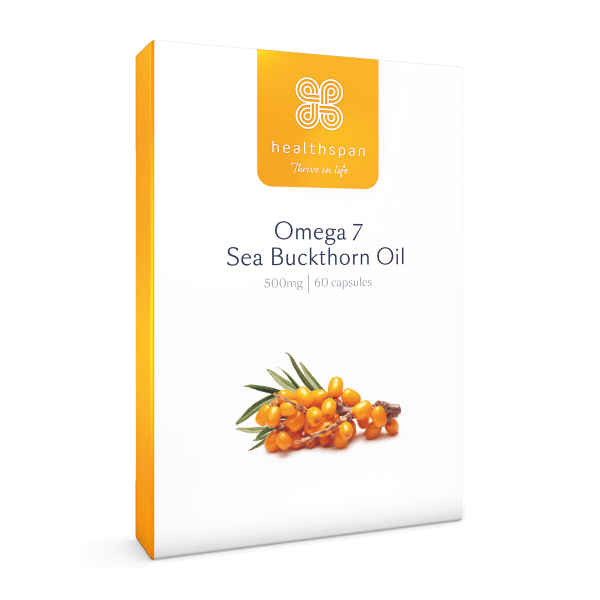
Omega 7 Sea Buckthorn Oil
High levels of omega-7 and rich in omega-9 fatty acids
- 190mg omega-7 and 35mg omega-9 fatty acids per capsule
- Added vitamin A to support skin and mucous membrane health
Omega 3
These important oils provide vital building blocks (DHA and EPA) that are needed for optimum visual perception in the retina and brain. DHA is incorporated into the membrane of retinal cells and, if your diet is poor in DHA, your risk of age-related macular degeneration (AMD) may increase.
Research involving almost 90,000 people found that a high dietary intake of omega 3 reduces the risk of developing late AMD by 38 per cent. Eating fish at least twice a week reduced the risk by 24 per cent.
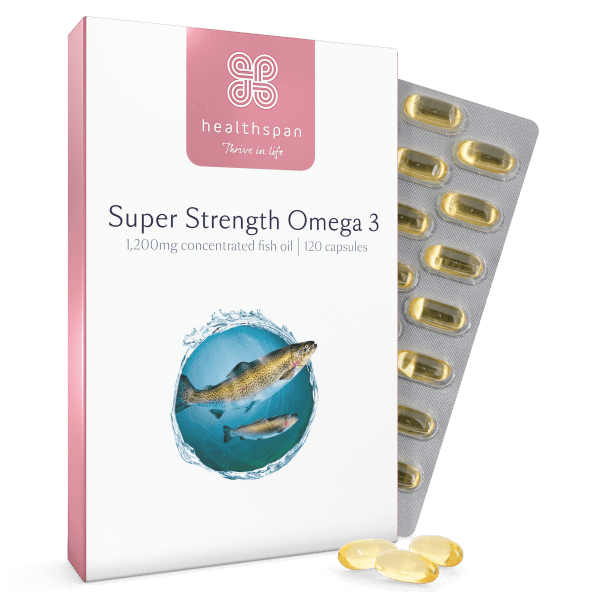
Super Strength Omega 3 1,200mg
Highly concentrated, refined and sustainably sourced omega-3 fatty acids
- 240mg DHA and 360mg EPA
- Anti-inflammatory; supports brain, eye and heart health
- Benefits of oily fish for 12p a day
Lutein and zeaxanthin
These yellow, carotenoid pigments are found in yellow, orange and red vegetables such as carrots, plus green leaves such as spinach. Taking 10mg lutein supplements per day has been shown to improve macular pigment levels by 50 per cent within one year.
Research published by the American Optometric Association shows that taking 10mg lutein supplements per day can improve visual acuity in those with 'dry' AMD by the equivalent of 5.4 letters on a Snellen visual chart, compared with no improvement in those taking inactive placebo.
A study involving almost 77,500 female nurses aged 45-71 years also found that high intakes of lutein and zeaxanthin reduce the risk of cataracts by 22 per cent, after controlling for other risk factors such as age and smoking.
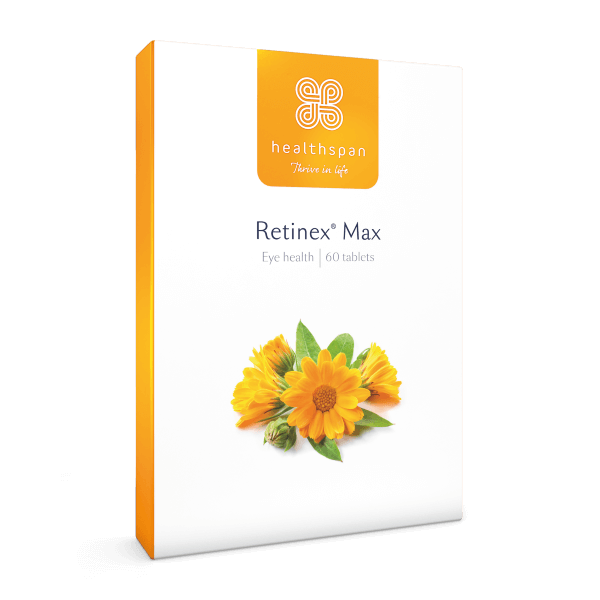
Retinex Max
'Nature's sunglasses' containing lutein and zeaxanthin
- Contains 20mg lutein and 2,000mcg zeaxanthin
- Powerful carotenoids found in high concentrations in the eye
- Supports long-term eye health
Vitamin C
This well-known vitamin is an important antioxidant in the fluid parts of the eye. Research involving over 77,000 nurses found that taking vitamin C supplements (typically 250-500mg daily) for at least 10 years reduced the risk of developing cataracts by 45 per cent compared to those not taking supplements.
In fact, 60 per cent of early cataracts occurred in women who had not taken vitamin C supplements, even though they had a naturally high dietary intake of vitamin C averaging 130mg per day. Only those taking additional vitamin C supplements seemed to obtain a benefit.
Other studies also show that taking vitamin C supplements can reduce the risk of developing cataracts and moderate lens opacities by 70 per cent or more, compared with similar people not taking supplements.
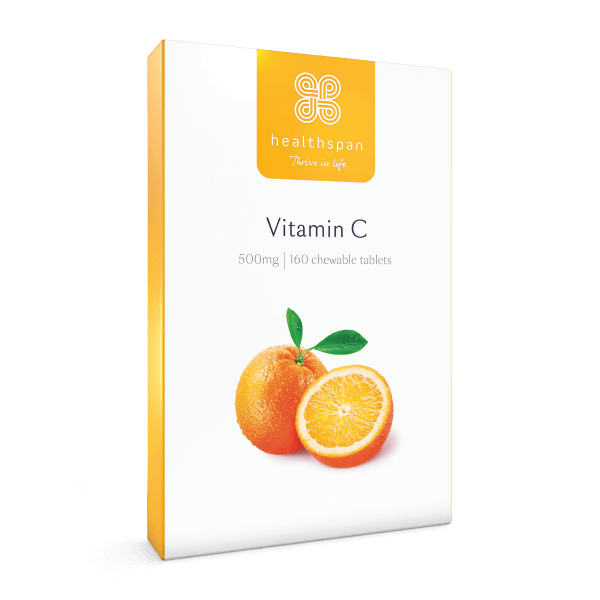
Vitamin C 500mg
Chewable tablets with 500mg vitamin C. Vegan-friendly
- Supports immunity, bones, joints and skin
- Added citrus bioflavonoids to combat free radicals
- Free from aspartame
Vitamin E
Vitamin E is another important antioxidant, in this case in the fatty parts of the eye such as cell membranes. Long-term use of vitamin E supplements were found to reduce the risk of cataracts by 55 per cent in women with the highest (more than 90mg) versus the lowest (less than 12mg) daily intake of vitamin E.
People with the highest intake of vitamin E are also 50 per cent less likely to develop cataracts severe enough to need extraction compared to those with the lowest intakes.
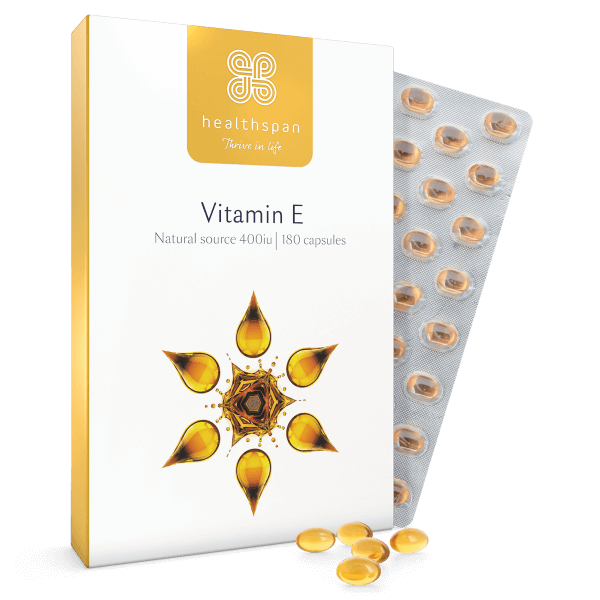
Vitamin E 400iu
Natural source vitamin E
- Natural source D-alpha-tocopherol
- With natural vegetable oils for easy absorption
- Powerful antioxidant support to combat cell damage
Eye supplements are often recommended by ophthalmologists to help prevent or treat age-related macular degeneration. These combinations usually include carotenoids (e.g. lutein, zeaxanthin, and betacarotene), vitamins C and E, the minerals zinc and copper, plus the omega 3 fatty acids, DHA and EPA. These supplements have the potential to delay the onset of age-related macular degeneration and may reduce its progression and the risk of vision loss.






